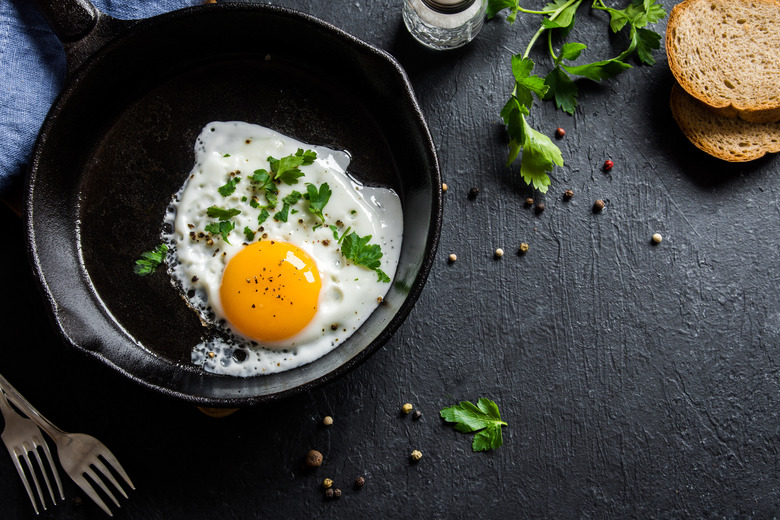11 Reasons To Eat An Egg Every Day Gallery
Eggs have cooked up some controversy in the past couple of years. They used to be recommended as a healthful addition to every diet; but then, concerns about cholesterol arose and influenced diners everywhere to order their omelettes with the whites only. But according to more recent research, eggs might not be as unhealthy as doctors previously thought. In fact, while it might be best to eat eggs in moderation, they do have some impressive health benefits.
Current dietary recommendations advise eating one to two eggs per day. This limit is easy to exceed, since there are so many ways to eat eggs that you could eat one at every meal without getting bored.
How does one prepare an egg? You have dozens of options.
There's simply boiling them — which is surprisingly difficult to do perfectly well. Hard-boiled eggs are a great topping for salads, can be easily crafted into a delicious deviled egg appetizer, or eaten on their own as a satisfying snack.
You could fry an egg and use it as a surprising topping for another nutritious dish, an unexpectedly delicious combination. Eggs sunny-side-up never disappoints, of course, whether you eat it as part of breakfast, lunch, or dinner. No matter how you prepare your egg, prepare to experience all the health benefits that ensue.
It Could Boost Your Energy Levels Naturally
Do you find yourself relying on caffeinated, chemical drinks to keep you alert during the day? You might be in need of some B vitamins, which help your body to convert energy from food into usable fuel for your body. Eggs contain a large amount of B vitamins; pairing an egg with your food could help you feel more alert and energized without those scary supplements!
It Could Help Your Hair Grow Faster
Egg yolks contain biotin, vitamin B6, vitamin B12, and vitamin A, all of which can help your hair to grow faster. Got a bad haircut? Eat an egg. You might also consider eating these other foods, as well, to load up on the nutrition your head needs to grow longer locks.
It Can Improve Your Eyesight
When you think of foods that help your eyes, you probably think of carrots and sweet potatoes. But these orange foods aren't the only foods with vitamin A, the nutrient that helps your eyesight to last longer. Eggs contain both vitamin A and lutein, which can decrease your chances of needing a stronger prescription.
It Could Prevent Heart Disease
A recent study showed that people who ate approximately one egg per day had a lower risk of heart disease and stroke than those who avoided eggs. So go ahead — make eggs part of your morning routine!
It Boosts Brain Function
Eating a smart breakfast might actually make you smarter, according to some research. Healthy fats found in egg yolks are essential for supporting your brain function. Research has shown a similar effect in babies' brain development, implying that feeding babies eggs — or other foods with similar nutrients — can help boost their brain development and prevent stunted growth.
It Could Raise Your ’Good’ Cholesterol
Eggs are considered a high-cholesterol food — but what that designation doesn't include is the fact that eggs are high in the right type of cholesterol. There are two types of cholesterol: HDL and LDL. HDL is "good" cholesterol and LDL is "bad" cholesterol. Eating more eggs can increase your HDL, or "good" cholesterol; not all high-cholesterol foods are bad to eat!
It Could Alter Your ‘Bad’ Cholesterol
People have historically been educated that eating too many eggs increases LDL, the "bad" cholesterol. However, many people don't realize that there are subtypes of LDL cholesterol: small, dense LDL and large LDL. Small, dense LDL is much riskier than large LDL, some studies have shown. Eggs can convert small, dense LDL to large LDL — which could protect your heart.
You’ll Get More Protein
Proteins, made up of amino acids, are literally the building blocks of every cell your body creates — which means that getting enough protein from your food is essential for healthy cell regeneration. Of course, there are other ways to get your protein outside of eggs. But eggs contain every amino acid necessary to make full use of the protein you consume. A single egg contains 6 grams of protein; adding an egg to your meal will not only provide extra nutrition, but it'll also help keep you satisfied.
You Probably Need More Choline
According to the National Institutes of Health, most Americans do not get enough choline from their daily diet. If your choline levels drop too low, you can experience muscle and liver damage. Eggs have lots of choline, thankfully — so eating eggs can help stave off these conditions.
Your Skin Will Be Better Protected from the Sun
In addition to helping out your vision, the carotenoids in eggs can improve the health of your skin. According to some studies, these nutrients can filter out certain harmful rays from entering your skin cells, reducing the damage you experience from exposure to UV light. You might still get sunburnt, so you still need to wear sunscreen. But you'll be better protected against skin cancer, which could only really be a good thing.
It Could Prevent Metabolic Syndrome
One study showed that for people over 40 years old, increased egg consumption resulted in a lower probability of risk factors for metabolic syndrome. Metabolic syndrome is a blanket term for a cluster of undesirable diseases related to your metabolism. It's also worth noting that failing to eat enough nutrients could slow down your metabolism, as can these other diet-related mistakes.
More from The Daily Meal:
What the World's Oldest People Eat (or Ate) Every Day
20 Reasons to Eat an Avocado Every Day
20 Reasons Why You Should Drink a Glass of Wine Every Day











